When designing or renovating a home in Melbourne, the choice of flooring is one of the most impactful decisions homeowners face. Among the various options, epoxy flooring and concrete flooring stand out as two of the most popular and practical solutions. Both materials offer unique advantages, but they also come with distinct drawbacks. So, how do you decide which flooring is best for your Melbourne home? This article will dive deep into the key differences, advantages, and limitations of epoxy and concrete flooring. By the end, you’ll have a clearer understanding of which option aligns with your home’s style, functionality needs, and budget.
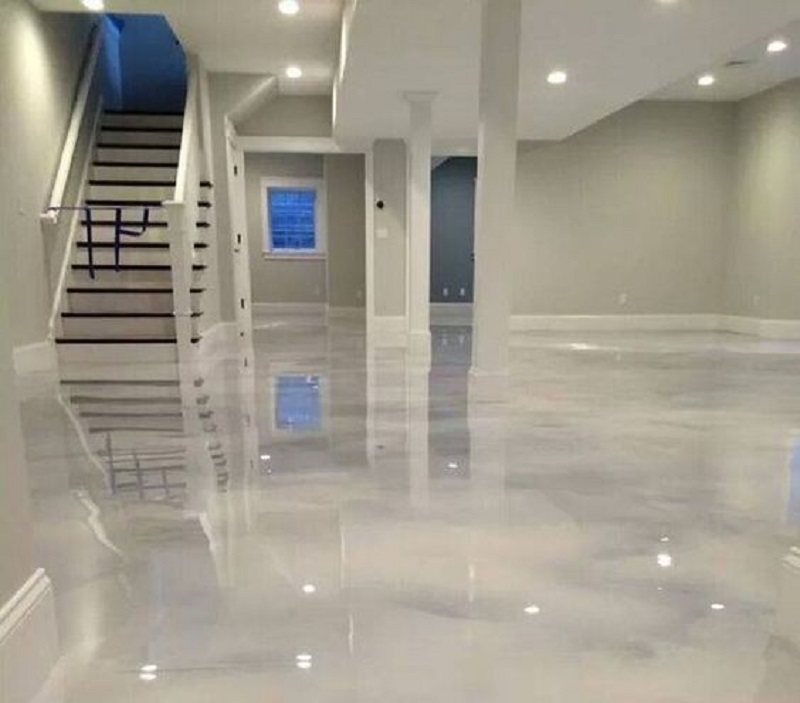
Pros and Cons of Epoxy Flooring
Epoxy flooring has gained immense popularity in recent years, thanks to its sleek appearance, durability, and versatility. But is it the right fit for your Melbourne home? Let’s break down the pros and cons.
Pros of Epoxy Flooring
1. Aesthetic Appeal and Customization Options
Epoxy flooring offers an unparalleled range of customization options. With a high-gloss finish, it can mimic luxurious materials like marble or quartz at a fraction of the cost. Homeowners can choose from a variety of colours, patterns, and textures to match their interior design. Additionally, metallic epoxy finishes are a growing trend, providing a unique, modern look.
In Melbourne homes, where contemporary and minimalist designs dominate, epoxy floors can complement open-plan layouts and enhance natural lighting with their reflective properties.
2. Durability and Resistance
One of the standout features of epoxy flooring is its resistance to stains, chemicals, and moisture. This makes it an ideal choice for areas prone to spills, such as kitchens, garages, and basements. Melbourne’s humid conditions, especially during winter, won’t affect epoxy floors, as they are highly resistant to water damage.
Moreover, epoxy flooring is tough against daily wear and tear, withstanding heavy furniture, foot traffic, and even vehicle loads without cracking.
3. Ease of Installation and Maintenance
Although professional installation is recommended, the process of applying epoxy is relatively quick compared to other flooring options. Once installed, maintenance is minimal—sweeping and occasional mopping are usually enough to keep it looking new. Unlike concrete, it doesn’t require frequent resealing.
Cons of Epoxy Flooring
1. Initial Installation Cost
The upfront cost of epoxy flooring can be higher than traditional concrete, especially for premium finishes or intricate designs. However, this investment often pays off over time through durability and reduced maintenance costs.
2. Potential for Slipperiness
While epoxy floors are stunningly smooth, they can become slippery when wet. Adding anti-slip additives during installation can mitigate this risk, making it safer for households with children or elderly family members.
3. Installation Time and Fumes
The installation process requires multiple layers, which need time to cure. Additionally, the fumes released during application can be strong, so proper ventilation is essential.
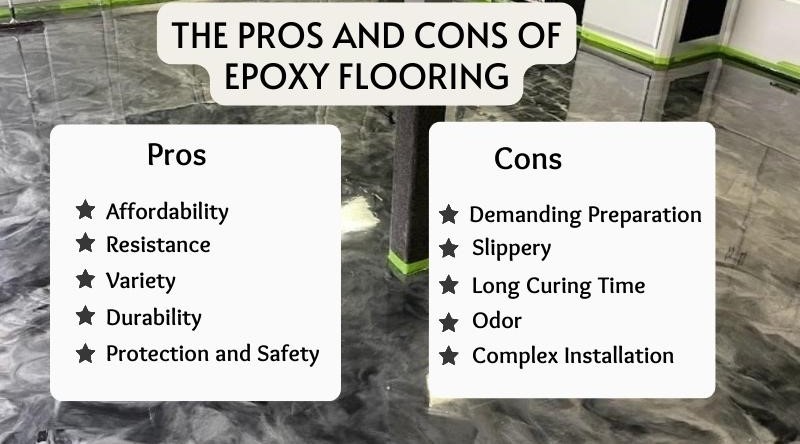
Pros and Cons of Concrete Flooring
Concrete flooring, a time-tested option, is revered for its simplicity and robustness. But how does it compare to epoxy flooring? Let’s explore its advantages and disadvantages.
Pros of Concrete Flooring
1. Natural, Minimalist Look
Concrete floors are celebrated for their raw, industrial aesthetic. For homeowners seeking a minimalist or rustic style, polished concrete floors can provide a timeless, elegant look. They pair well with the natural tones and textures common in Melbourne homes.
2. Durability
Concrete is one of the most durable flooring materials available. It can last decades with proper care and is highly resistant to fire and pests. For outdoor areas or homes with high foot traffic, concrete flooring is a practical and long-lasting choice.
3. Affordability
When it comes to initial costs, concrete flooring is often more affordable than epoxy. For budget-conscious homeowners, this can be a significant factor.
Cons of Concrete Flooring
1. Prone to Cracking
Despite its durability, concrete is susceptible to cracking over time. Melbourne’s fluctuating temperatures and soil conditions can exacerbate this issue. While some homeowners appreciate the character that cracks add to concrete floors, others see it as a drawback.
2. Maintenance Requirements
Concrete floors require regular sealing to maintain their appearance and prevent stains. Without sealing, they can become porous, making them prone to moisture damage and discolouration.
3. Cold and Hard Surface
Concrete’s hard surface can be uncomfortable to walk on for extended periods. It also tends to retain cold, which can be a downside during Melbourne’s chilly winters.
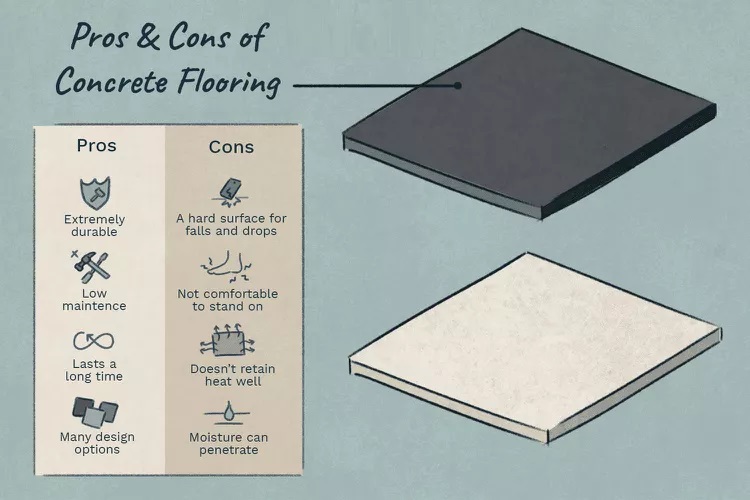
Which Flooring Is Best for Melbourne Homes?
Deciding between epoxy and concrete flooring depends on various factors, including your lifestyle, aesthetic preferences, and the specific conditions of your home.
1. Lifestyle and Usage
- Epoxy Flooring: Ideal for homeowners who prioritize aesthetics and require a low-maintenance option. It’s particularly suited for families with young children or pets due to its stain resistance.
- Concrete Flooring: Better for those seeking a rugged, natural look and don’t mind periodic maintenance. Concrete is also a good choice for outdoor spaces like patios.
2. Melbourne’s Climate
Melbourne’s climate can influence your choice. Epoxy flooring, with its moisture resistance, is well-suited for the city’s humid winters. Concrete, on the other hand, may require extra care to prevent cracks due to temperature changes.
3. Aesthetic Preferences
Epoxy offers unparalleled customization, allowing you to tailor the floor to your home’s design. Concrete provides a more neutral base, blending seamlessly with various architectural styles.
4. Durability and Maintenance
Both options are durable, but epoxy flooring edges out concrete in terms of long-term maintenance. Concrete’s need for regular sealing can be a drawback for some homeowners.
5. Cost Comparison
While concrete floors may have a lower upfront cost, the long-term expenses of sealing and crack repairs can add up. Epoxy flooring requires a higher initial investment but often proves more cost-effective in the long run.
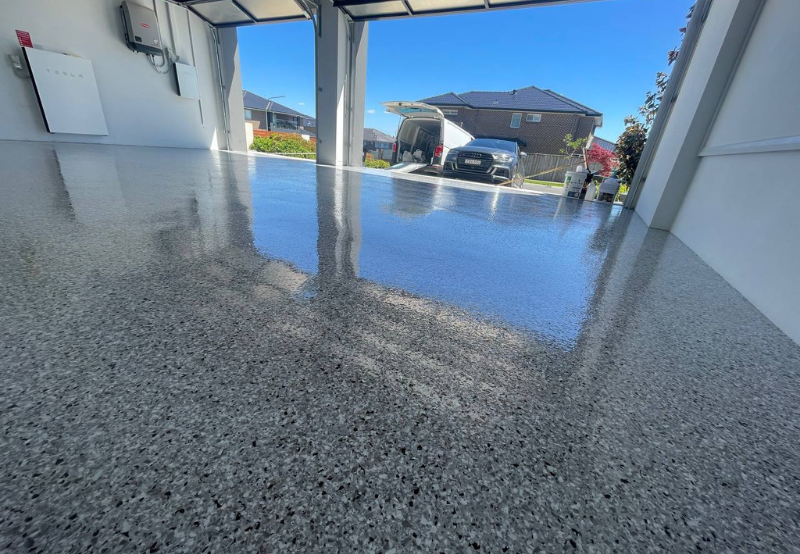
Conclusion
Both epoxy and concrete flooring have their merits, and the choice ultimately depends on your needs and preferences. If you value modern aesthetics, low maintenance, and long-term durability, epoxy flooring is an excellent choice. However, if you prefer a natural, minimalist look and don’t mind occasional maintenance, concrete flooring might be the way to go.
For Melbourne homeowners, it’s essential to consider factors like climate, lifestyle, and budget before making a decision. Consulting with a professional flooring expert can provide tailored advice and ensure the best results for your home.
What’s your flooring choice? Share your thoughts or questions in the comments below, and don’t forget to explore our other resources for floor improvement tips. If you found this article helpful, share it with your friends or family who might be contemplating a flooring upgrade!




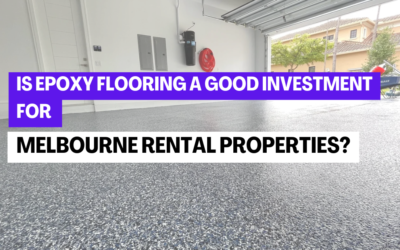
0 Comments